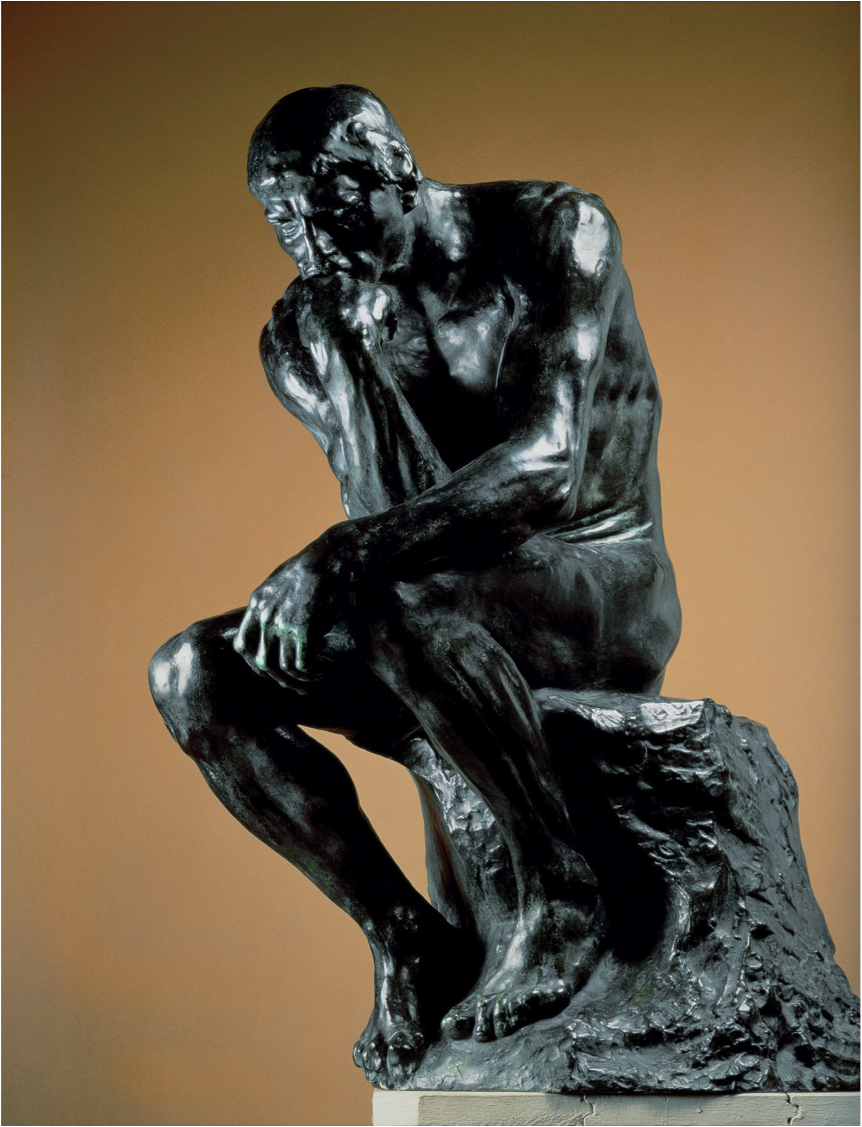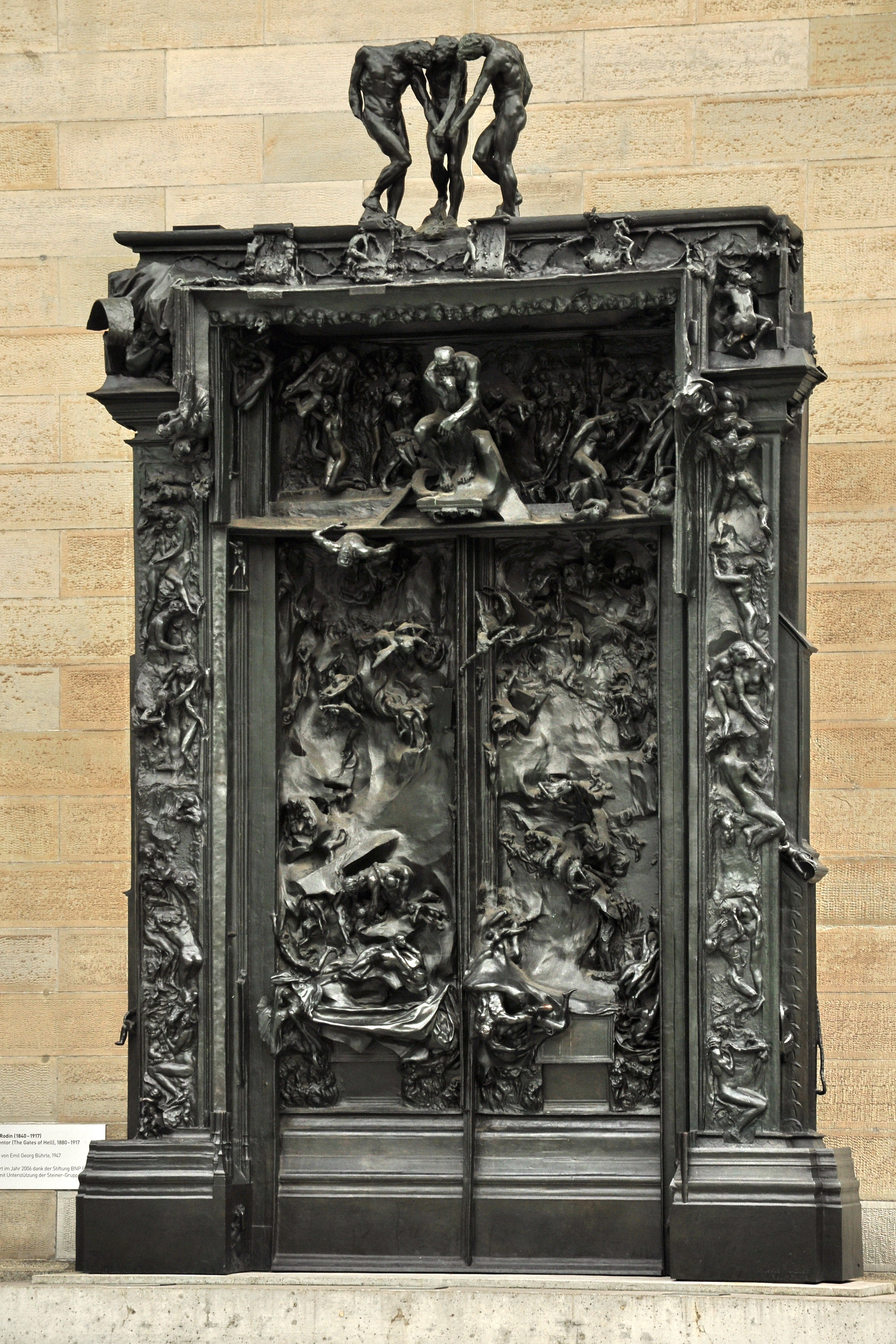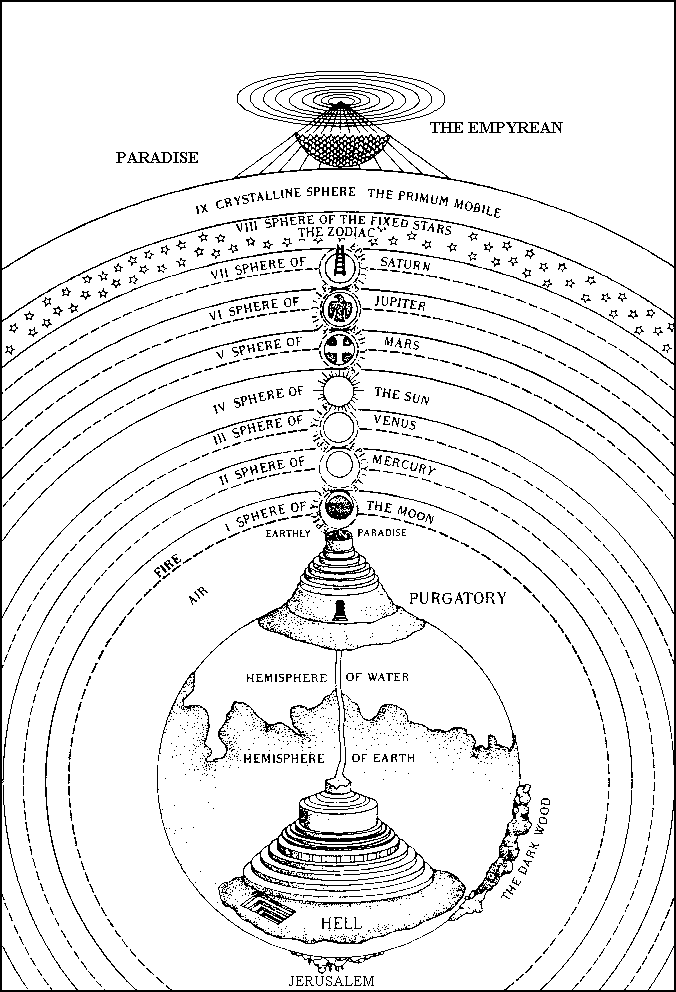 Home Page
Home PageInferno
Who is this man and what is he thinking?

It's Durante Alighieri - Usually shortened to Dante. The statue is an expanded part of Rodin's "Gates of Hell."

There is debate over whether the Thinker is indeed Dante, but I believe that he is. The scenes from "The Gates of Hell" are rooted in the mind of Dante. Dante looks realistic to us. Based on Fransciscan approach. They wanted to be realistic in thinking of the wounds of Christ to help meditation.
- Dante's Inferno is his best work.
- Purgatorio is less so.
- Paradiso is the least read & the hardest to appreciate.
Different from 19th century realism, which only points to itself. This realism points to the 'higher' levels of meaning. Dante is realistic in his depiction and precise in his word choice.
Dante makes us see what he wants us to see and feel what he
wants us to feel. Like a Franciascan mystic. Here is
Dante's universe:

METER
Dante writes hendecasyllabic verse (11 syllables per line). In Dante's Italian poetry, Dante usually ends a line with an accented syllable on the 10th syllable. Italian tends to accent the 1st syllable of a two syllable. Often get an unaccented 11th syllable. Some lines end on the 10th syllable, with it accented.
Tend to run vowels together that are next to each other - elision.
Italian counts syllables in its poetry. Italian is just developing.
1.1 Nel mezzo del cammin di nostra vita
Is a standard hendecasyllabic line
che la diritta via era smarrita
11 if you elide a & e
Dante speaks the Florentine dialect. Were dialects in Sicily and Northern Italy. Chaucer very different from modern English. Dante is much closer to modern Italian than Chaucer is to modern English.
Rhyme scheme
Terza rima
b
a
b
c
b
c
d
c
3 lines per stanza - Trinity
33 syllables per stanza - age of Christ
Emphasis on the next world. His whole epic is usually one episode of the traditional epic. Gilgamesh, the Odyssey and the Aeneid have the traditional short visits to the underworld.
For Dante, this world is a preparation for eternity. The next world is the one that matters.
Genre
1. Epic
We call it an epic. It elaborates one episode of a traditional
epic.
Gilgamesh goes to underworld for find eternal life;
Odysseus to find his way home;
Aeneas to see Roman history.
Dante writes about himself as the epic hero. Usually write about someone else.
2. Comedy
But Dante calls it a Commedía. Called Divina Commedía in 1555 edition.
A commedy is supposed to be funny - but this is rarely funny. One devil wants to poke Dante in the ass. In another scene, the devils fart together.
Why does Dante call it a Comedy? b/c comedy involves restoration of order. Therefore start with disorder. Comic plot structure is disruption followed by restoration.
Dante is headed down at the beginning. He's lost halfway through life's way, life's via.
He has veered off the strait and narrow.
Lost in the silva asperra, dense, dark woods. Dark signifies evil. Like Plato's people chained the the dark cave of ignorance.
He is headed for a tragic ending, going to hell. BVM sees this. Wants to give him a chance.
Dante is given a tour of the next life so he can see clearly the consequences of his actions. If he sees clearly, he will change the course of his life. One he was blind; now he can see.
Most people prefer to stay in the cave.
What about the people in hell? 1st circle pagans didn't know; get a comfortable spot in hell. Others did know; chose to persist in their behavior.
Purgatory. They are being cleansed. Punishments are similar to those in hell; but those in purgatory know they'll eventually get out. They are willing to undergo the suffering.
Most people go to Purgatory; only hardened sinners go to hell.
They put themselves in hell by refusing to chose a different
couse of action, by refusing to choose God.

Paolo and Franscesca

Paolo and Franscesca. This vision is based on the
historical account of Francesca, who was wedded in or around
1275 to Giovanni Malatesta, known as "Giovanni the
Lame." The marriage was arranged by her parents, and she
felt no attraction toward him. Instead, she fell in love
with his brother Paolo. When Giovanni found out, he killed
them both. Then they went to hell, where Dante sees them
blown by the winds of lust.
Why are they in Hell rather than Purgatory? Modern readers
sympathize with them. They chose to be with each other even
though that was wrong. Implication is they would have still
chosen each other even if given the tour of afterlife. They
would never choose an alternative, can therefore never repent.
Will always chose their improper desire. Not there b/c God
judged them & cast them there; they put themselves there.
Their punishments extend their bad choices. Dante's problem with
courtly love. He faints after hearing the story - had loved
Beatrice himself. Sees this as his fate.
The implication is that lust -- cupiditas (Eros/Cupid)
-- is a powerful emotion that can destroy us. It is also
contageous. Paolo and Francesca fall in love while reading
about Lancelot and Guinevere. They serve in turn as an
obvious model for Romeo and Juliet, where Shakespeare
somewhat tames the passions of courtly love through the
institution of marriage. Not that that does much good,
since they died anyway.
Rodin chose the beautiful Camille Claudel as the model for
Francesca. She also became the Rodin's student and
lover. She was an artistic genius in her own right, but
she descended into madness, accused Rodin of plotting to kill
her and steal her ideas, and began destroying her works.
Rodin made several copies of the statue; in 1900 he made one for
Edward Perry Warren, a rich gay man who wanted his Paolo to be
anatomically correct. The sculpture was so controversial
that it spent several years behind drapes so that local students
and soldiers passing through town on their way to WWI would not
be incited to lust. Ancient Greeks and Romans (along with
the priest from Romeo and Juliet) counseled moderation
in affairs of the heart; neither too little nor too much.
Excessive love was a νόσος, a disease.
Comedy. Restoration of order after disorder. Paradise is the ultimate structured order.
3. Encyclopedia
Genre is also an Encyclopedia - a collection of odds and ends. Meets Bernetto Lattini. Went to hell for being homosexual. He wrote an enclyclopedia.
Pliny wrote an ancient encyclopedia Science, mythography, history, literature, etc., all considered.
4. Travelor's tale -
Odysseus, Aeneas, Brenden's account of Purgatory.
5. Medieval Vision
Apocalypse of St. Paul. St Patrick's Purgatory. Boethius. Celestial Hierarchy by Dionyus Aeropagite. Somnium Sciopionus.
6. Spiritual Autobiography
Augustine Confessions. Boethius Consolation of Philosophy.
7. Allegory
Dante's patron Con Grande asked Dante to explain the meanings of the Comedy. Dante writes him a letter explaining the comedy in 4 levels of meaning.
- Literal level. Dante meets Virgil; goes on journey.
- Allegorical/figurative level. Moral allegory.
Comes from Greeks. They studied Iliad and Odyssey.
Boys taught that they were true on the literal level; they
were also useful for moral guidance. Hector is what we should
be like. Brave, trustworthy, etc. Don't want to be like
Agamemnon or Paris.
In the Hellenistic Period (Alexander the Great - Rome), he'd conquered the known world. Established a military colony in Egypt - Alexandria. Had a great library, good poets, etc. Ruled by Ptolemy & his descendants. Had ex-soldiers, many others from the ancient world. Big Jewish center there. Philo had been educated in Jewish schools, read Jewish scripture. Also studied in the Greek schools. Alexander set up Greek schools everywhere. Philo learned Greek texts; read them literally and morally. He read the scriptures literally, but also morally. Read Joshua literally, but see him as a good moral example as well.
Church followed Philo's example. Xnity. Church read OT; began to develop its own literature. Mark may have read Homer; constructed X as epic hero. Church decided to keep Jewish scripture. Called this the Old Testament. Called the Xn writings the New Testament. - Typology. Another way the church read scripture was
typology. Find a model in the OT to be fulfilled in the NT. OT
foreshadows the NT.
Jonah. He really existed. Literal level. Moral level - he's an example of what happens when you disobey God, also of what happens when you repent. Typologically foreshadows X being buried 3 days.
The letter kills, but the spirit gives life - must read the text symbolically. Agugstine kept his books where Jerome threw his away. Augustine reads pagan texts though the allegorical lense. - Anagogical level. Holy mysteries. Not very well defined. Revelation of spiritual truth hidden in the text.
Three beasts are evil habits that make reform impossible for the unaided.
- She-wolf - incontinence. Lust, drunken, gluttony
- Lion represents sins of violence - against God, others, self
- Leopard = Fraud - worst of the sins. Is a perversion of what makes man human, his consciousness.
- Journey through Hell - turn back on sin
- Journey through Purgatory - purge sin
- Journey through Paradise -
Passages
Canto 5. 74. Paolo and Franscesca.
AMOR which leads them - what love is it? Love for each other
Tell us your story, it one permits it (God's name can't be
spoken in Hell). They are with DIDO in hell. Dido
implies Cleopatra, Medea, etc.
Francesca speaks - Paolo is silent.
"Love, which is quickly kindled in a gentle heart" From a gens,
a noble family. Only members of the aristocracy could experience
true love. Peasants only deal with lust. Gentlemen and ladies
deal with courtly love.
She keeps repeating the word amor
Augustine divides amor into caritas and cupiditas.
She chooses door number 2 - cupiditas.
Paolo was the younger brother. Older brother was ugly but macho. Sent younger brother to woo for him. He marries her on behalf of his brother. He turns out to be brutish. She can't love the older brother.
Read story of Lancelot. Kissed when he did. The brother killed them both together before they could repent. Should be in Purgatory. Why are they in hell? Implication is they would never have repented. They would always have chosen each other.
Dante faints b/c he's so moved.

Home Page
